Jack Burch on the Depression, the War and His Career in the Press
Jack Burch (b. 1922) remembers his childhood in the Depression era, his days as a bomber pilot in World War II and his work as Editor of The Highland Echo.
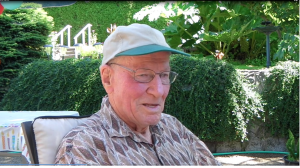
I was born in Winnipeg in 1922 and a year later my parents and I came to Vancouver. We moved to 2451 Parker Street in about 1925 and then finally to 3rd Ave and Nanaimo in 1928, and that’s where we stayed.
One of the things I can remember was when we moved to 3rd and Nanaimo (I was about six in 1928), and at that time, young guys from the Prairies were coming west on the top of boxcars or anywhere else that they could because their families couldn’t support them anymore. The crops were suffering terribly from the dustbowl dust storms and there was no employment. Another thing I remember was that these fellows settled in a hobo town between Clark Drive and Main Street, Broadway north towards what is now 1st Avenue and Terminal avenue. It was a shack town. These guys were all just young guys—22, 25, something like that. A friend of mine, Ralph Carr, and I used to go down on Saturday to see the roundhouse for the steam engine at the corner of Clark Drive and Canada Way. It was great because there was none of the restrictions they have today— we climbed into the cabin of these locomotives and fool around. But we also saw these fellows.
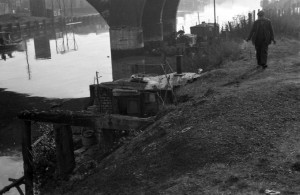
Image credit: James Crookall, public domain
I recall my mother saying “Where are you going, Jack?” And I would say “I think Ralph and I will go down to the flats.” My mother, who had lost another son in an accident some years before, said “Just a minute.” She came back with a brown paper bag and there’d be a half a loaf of bread, maybe some jam, and some tea leaves. And she’d say: “Maybe you’d better take that along too.” And I’d say “OK.”
So Ralph and I went to the flats and wandered along, and these guys saw me and said “Hi kid. What you got?” So we went over and they looked at us and said “We’ll you’d better sit down and have a cup of tea with us.” So we had tea out of a tomato can and listened to them talking, too young to realize how bad the situation was.
One other thing I can remember during those times is they would knock on our door, and, if dad was home— as he was most of the time because he was out of work, they would say “I wonder if you got any odd jobs”, and dad would say “Yeah, as a matter of fact, I need my garden dug up.” So he would take them along the back to the garden which had been dug a dozen times in the previous month, and say “Well, could you do something like that?” “Oh, yeah, yeah.” I can remember my mom and dad looking and the back window and saying “How many rows have you dug now, Frank?” “Well about three.” “Oh, I think that’s enough eh?” Call em in, give em lunch, roll a couple of cigarettes— roll your own’s, of course– and I could hear them talking about times.
That was my bringing up. My mom and dad never turned anybody away. And yet he was out of work more times than not. So we survived those years, from the 30’s to 39. And, of course, Hitler put pay to the Depression. That’s a doubtful thanks and I shouldn’t put it that way, but the rise of Hitler put pay to unemployment. And, suddenly, young people were offered three square meals, a roof over their heads, and a sense of respectability. That was the start of the 1st division, 2nd division, a lot of them who fought in Italy, a lot of them who died in Dieppe.
I was brought up in Grandview and I suppose I became a champion of the area over a period of time. I went to Lord Nelson Elementary for 6 years and then Templeton Junior High and Grandview High School of Commerce from 1937-1939. I quite school in grade 11 and went to work at a plywood mill on the Fraser River.
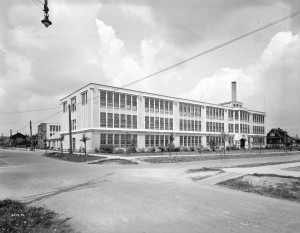
Image credit: Stuart Thomson, public domain
In the major part of the ’40s I was away overseas, ending up as a pilot in bomber command, and I did a tour of operations. I survived that and became an instructor on Lancasters, which is a four-engine bomber. After a tour of instruction, I volunteered for the Far East— that was in early ’45—and expected to go onto an aircraft called the Avro Lincoln, which was a larger version of the Lancaster. It was very similar to the American B-49s, which were very long range and heavy aircraft. Avro became a Canadian company because they weren’t making them fast enough in England and the Germans were shooting them down faster than we could build them. Maybe fortunately for me, the big bomb was dropped when I was on the Atlantic on my way home, so I took my discharge. I had a crew of six or seven of us; I got a gong (medal) at the end of the tour and I’d like to think it was awarded to the rest of the crew because we all survived, which wasn’t the case for pretty well every second man on the tour. It was a terrible war; casualties were almost beyond belief— there were a total of 125, 000 and in bombing command there were 55, 000 casualties. We were not able to fly high enough to get away from anti-aircraft fire.
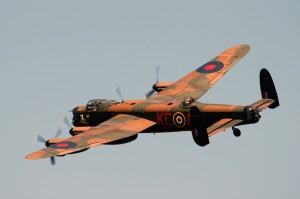
One day, I found myself in a small printing shop—Grandview Printing. I was there because I was the editor of a small monthly newspaper published by the Granview Legion 179; it was a per page sheet, and nobody else volunteered so I took over the role of Editor. At that time, a fellow considerably older than me came into the office and picked up a copy of The General Service, as it was called, and he read it. He asked if I wrote it, and I said yes. I accepted his offer as a gopher and I went to work for him and we got along very well. Alec, which was known up and down the Drive, had been the publisher of the Highland Echo since about 1924. He was from South Africa and he and I just seemed to hit it off. After a few years, he offered me a partnership and a few years later he sold me the other half. It was almost like having a second dad— although my father was still alive, at home and not working— but he wrote a nice piece, introducing me to the Echo readers. I remember he said: “Nothing has changed, just that instead of Jack taking orders from me, I’ll be taking orders from Jack.” So that was about 1947, give or take a year.
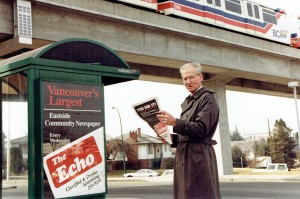
Alec passed a few years later and I went on with a newspaper called the Highland Echo, which at the time of my arrival was charging 10 cents per month for a weekly, with a bunch of kids who were being fined if they didn’t deliver the paper. The 3,000 circulation was, as I could almost readily see, a pain-in-the-neck. I took over from Alec and very shortly after I threw out the paid circulation, increased the circulation to 5,000, and made it all a throwaway, delivering basically from Clark Drive to Nanaimo Street and from Broadway to Venables.
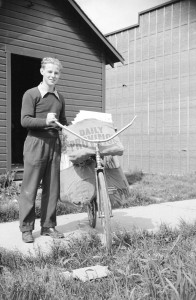
Image credit: Jack Lindsay, public domain
I went on like that for a considerable time. My children, Roberta and Janet, were old enough and didn’t need home care as much, so Jean came and joined me. Our daughters decided that they wanted to become a part of it and, with a new son-in-law named Mark Walker, it became a family operation. Over the years, the circulation increased and the influence broadened.
The Italian immigrants came to Canada and a good many of them settled in Grandview— so many, in fact, it was eventually called Little Italy. Our Grandview Legion, at about the same time, had formed a juvenile junior soccer school and we used to practice at Garden Park. These Italian fellows started to take an interest and offered to coach a bit, and they did it so well that Grandview was the leading soccer set-up in the whole province. We had six or seven leagues, from teenyboppers, right on up to whatever, and I can remember one year we won every division. In appreciation for their work and their good-heartedness, my branch made these fellows honorary members.
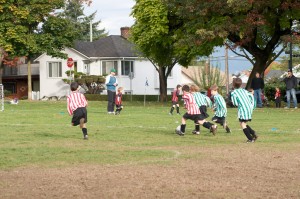
Image credit: Rudy Eng, CC, Flickr
Story edited by Jade McGregor
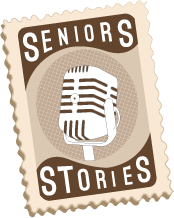



Leave a Reply